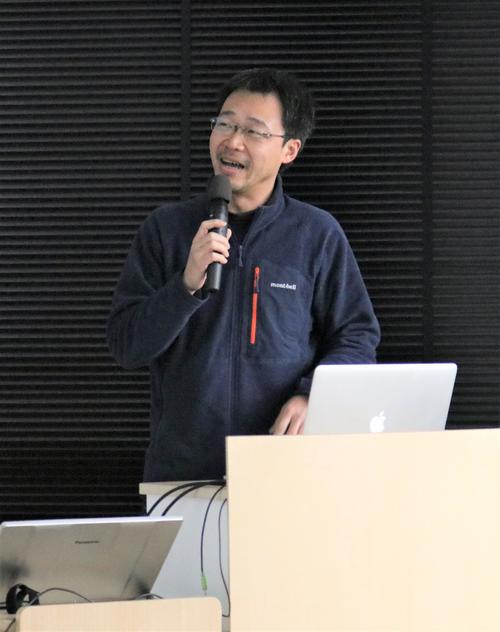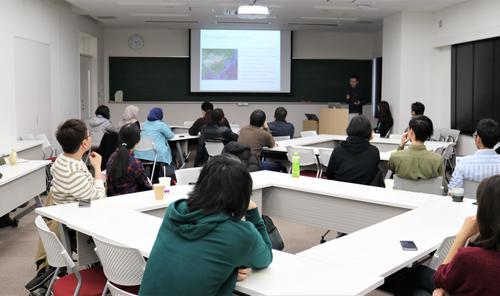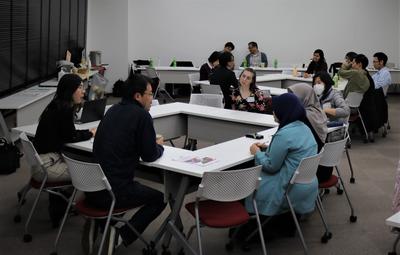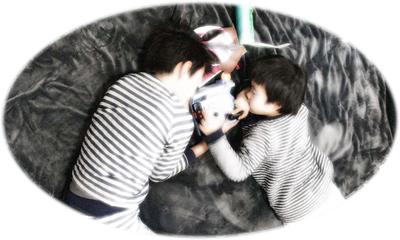Division for International Research and Educational Cooperation
Graduate School of Science and Faculty of Science , Tohoku University
Home > Voices from Alumni > What happened to me with IGPAS (Dr. MA Yue, Class of 2009)
Voices from Alumni
What happened to me with IGPAS (Dr. MA Yue, Class of 2009)
 DiRECT invited Dr. MA Yue, IGPAS alumnus (Class of 2009) to be one of the guest speakers for IGPAS Gathering 2020.
DiRECT invited Dr. MA Yue, IGPAS alumnus (Class of 2009) to be one of the guest speakers for IGPAS Gathering 2020.
Dr. MA Yue joined IGPAS in 2004 as one of the 1st batch of IGPAS students. IGPAS, newly inaugurated as one of the first International Priority Graduate Programs supported by MEXT, welcomed twelve students: three for the master's program and nine for the doctoral program that year.
Standing in front of the current IGPAS students, Dr. MA half-jokingly commented that he was happy to see the program survived this long. Although he is a very big upperclassman himself, in the opening, he said that his intention today would be to share his experiences and thoughts and not to tell them what to do. That was when the audience was more intrigued by his speech. Throughout the talk, we all were impressed with his kind and warm remarks toward his supervisor and his family.
|
Dr. MA Yue: Research Scientist, |
| << Presentation >> |
- Brief history
He was born in the northeast of China, around the time when the One Child Policy was implemented and the country was in transitional state from communism to capitalism. Having completed his bachelor's education at Lanzhou University, he started working at the Chinese Academy of Science. After two years, he came across IGPAS, and joined Prof. Tamura's group in the Department of Physics. When graduating from IGPAS, he obtained a post-doc position in Germany at the Helmholtz Institute Mainz to work with Prof. Maas. A few years later, he surprisingly returned to Japan to join Riken, his currently affiliation, with an astonishingly strong recommendation letter from Prof. Maas.
- Cultural friction and the breakthrough
Although his research life was very smooth and fulfilling, to the level that he did not mind spending 24 hours in the lab, there were things that bothered him occasionally. The first one came from his own reflection about the monthly salary he earned back in China, 200 US dollars, about "100 sweet potatoes" worth. The image nagged him, he felt small and unimportant.
Moreover, a colleague who did not return his "hi" made him sad.
One day, he overheard his colleagues making a remark about visiting researchers from China, "they are here just to enjoy shopping," and it really got on his nerve. From then, he was been moody, upset, distraught, and unmotivated.
Later, he talked with a Chinese architect from the School of Engineering. It turned out that the architect was a neighbor of Prof. Tamura, and Prof. Tamura asked him to talk to his student, sensing his dark mood and wanted to cheer him up. Upon realizing the professor's kind and attentive attitude, he regained his motivation and concentration. He then made up his mind to stay and continue his studies.
- Message to everyone
• Lab-oriented research training which you get through your graduate period will surprisingly enrich your knowledge and technique in the field. You should be confident because you will be competent after completing the program
• People around the world are surprisingly similar: equally lovely or comparably stupid
• Culture differences could be a barrier to separate people but may also work as a bridge to extend your world
•No matter whatever challenges you are facing now, you can figure out your own way to solve it
• You are not the only one!


| << Group Talk -- FAQ and more >> |
Q: What are the differences between a research institute and university? Can you tell us some characteristics of your current institute?
A: Surely the university gives you an education and a degree, whereas at the institute, you conduct research without the aim to obtain a degree. Each researcher is well respected, and although we work as a team, you cannot tell the junior researchers what to do. Only after convincing, it can be possible to get their help.
Until recently, a chief scientist led the team, choosing 10-20 members to conduct his project. These days, the system is changing, and younger PIs (Principal Investigators) have been leading laboratories. I suppose this is a welcoming change for you, young scientists, because more positions are available.
Moreover, Riken, once regarded as "paradise" for researchers, is facing many difficulties due to a tighter budget. Still, I think it maintains a researcher-friendly environment. It is very international, and all administrative documents are all written in both Japanese and English.
Q: How did you obtain the post-doc position in Germany? And having spent a few years there, what do you remember that distinguishes the academic environment there?
A: In getting a position, I got lucky. At the time I was graduating, Professor Mass in Mainz was looking for a staff member for his team and contacted my supervisor Prof. Tamura who recommended me. That's how I got it.
In addition, I felt that the atmosphere there was a little bit more relaxed. It is probably because they are not pressed for time. Until around ten years ago, those who were provided scholarships could spend up to twelve years. After that, the system changed, and people start to work earlier. I don't know if the situation is getting better, but it seems to me that they have well balanced academic life.
Q: Originally coming from China, do you want to go back to there? And what do you think about China nowadays?
A: I am the only person in my family who speaks Chinese (Dr. Ma's wife is Japanese, his two sons were born and raised in Japan). I once tried to teach Chinese to my son, but it did not work out well. Since my parents live in China, I need to do something in the future, but I do not know what.
I don't know much about younger Chinese these days, but I see they are more confident and comfortable with the current government. The number of students and institutes are increasing, and the budget has been growing. In other words, everything seems to be expanding. When I come up with an idea, the reaction I get are so different: In Japan, they say, "It is interesting but costs too much," whereas in China, "No problem about the money, but it is not interesting."
Q: Is it important to speak Japanese at work? How did you learn Japanese?
A: It is possible to continue to work without Japanese, but understanding the language will make your life much better and easier. Talking to colleagues in Japanese makes you closer to them.
To learn Japanese, I think I learned by watching TV. I watch it intently, reading subtitles, following kanji... my "active watching" helped, and after about two years, I suddenly start comprehending several phrases in Japanese.







